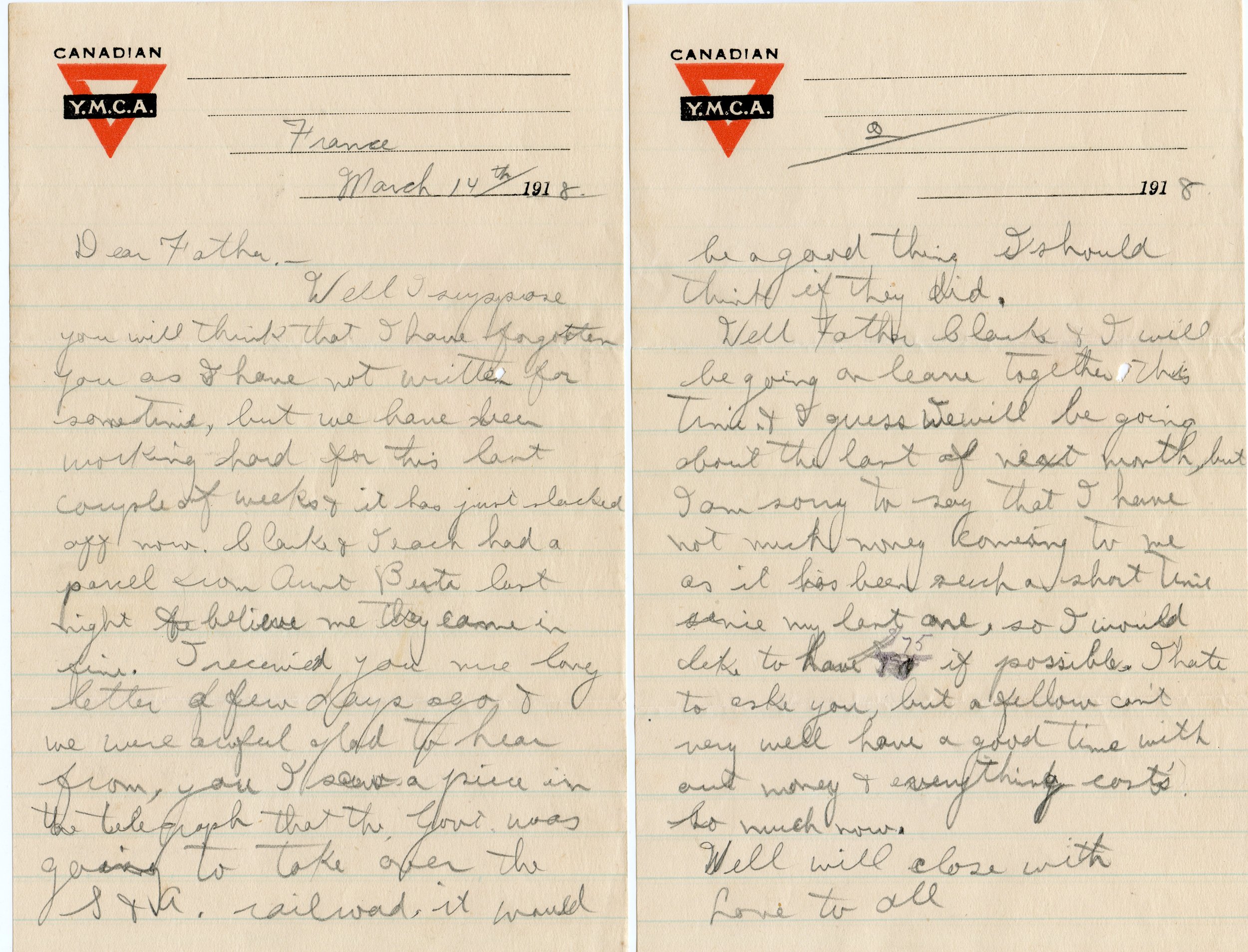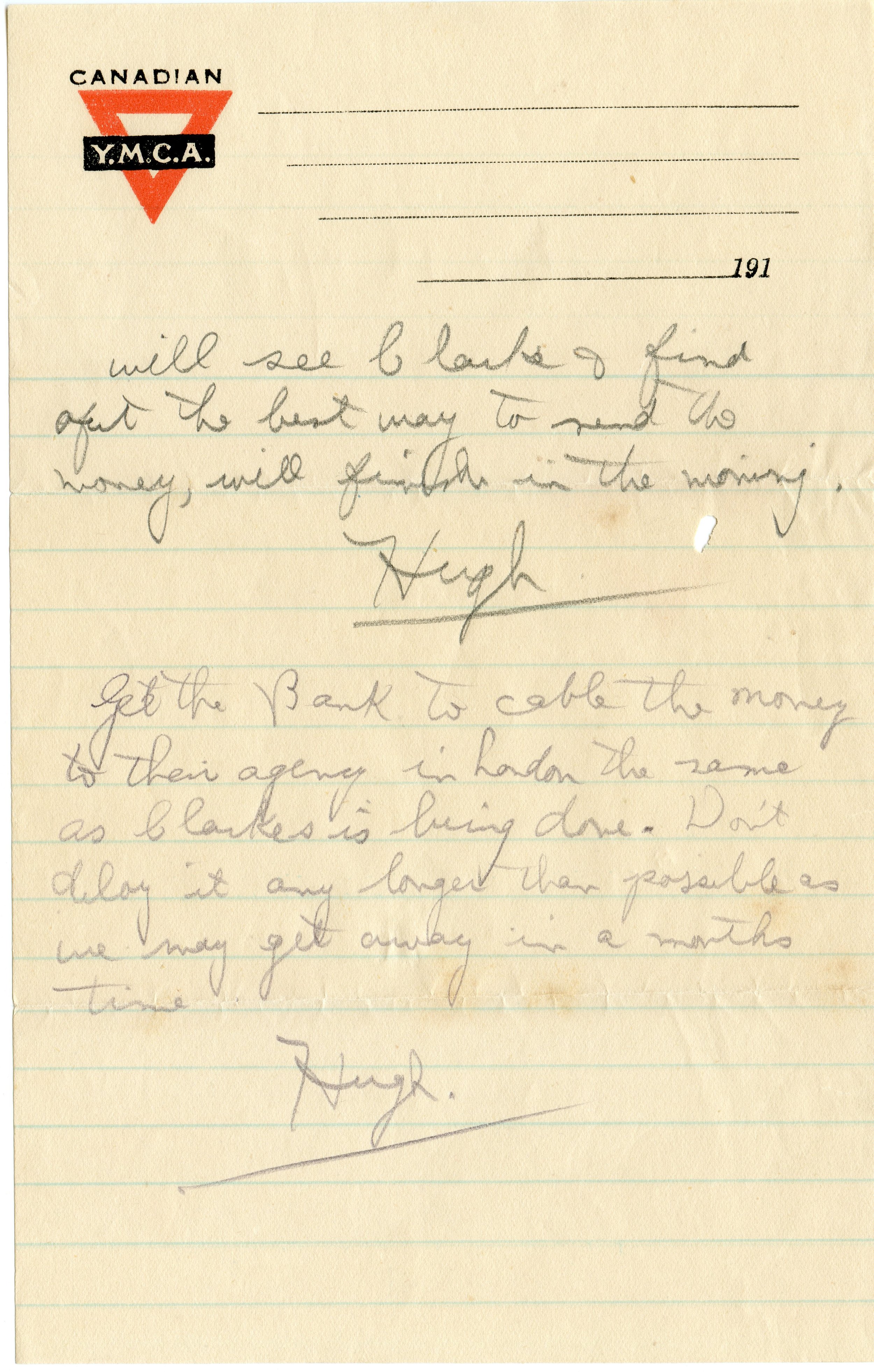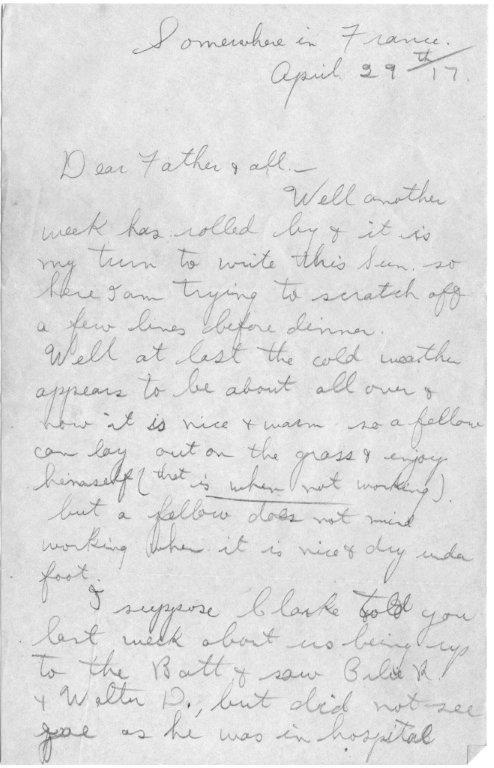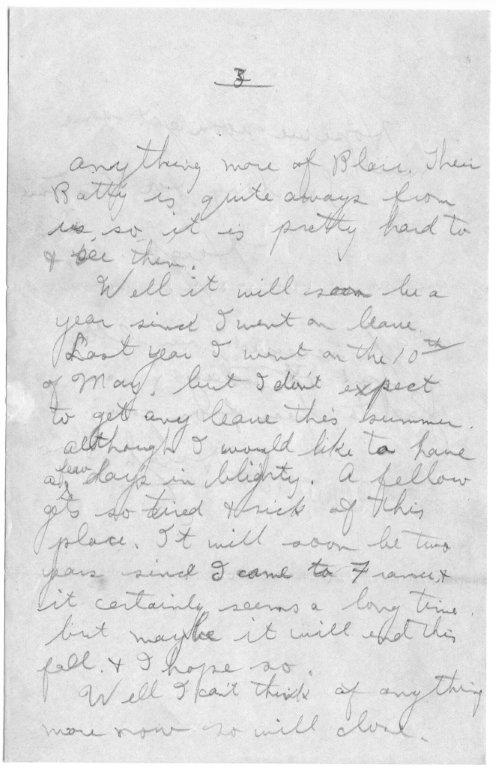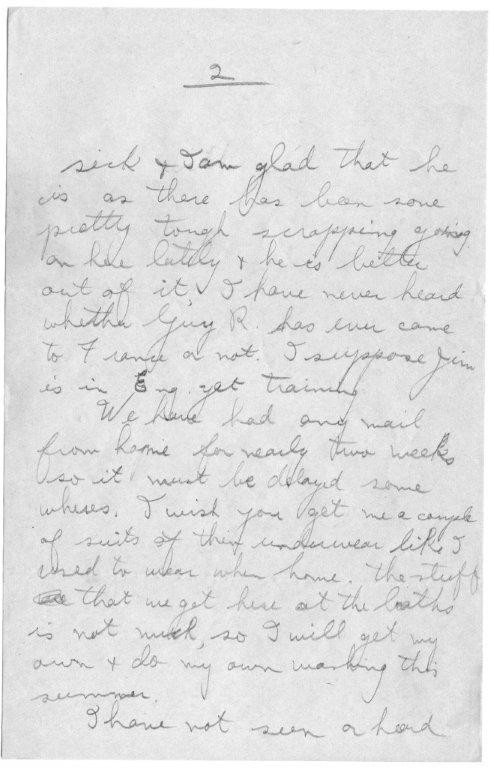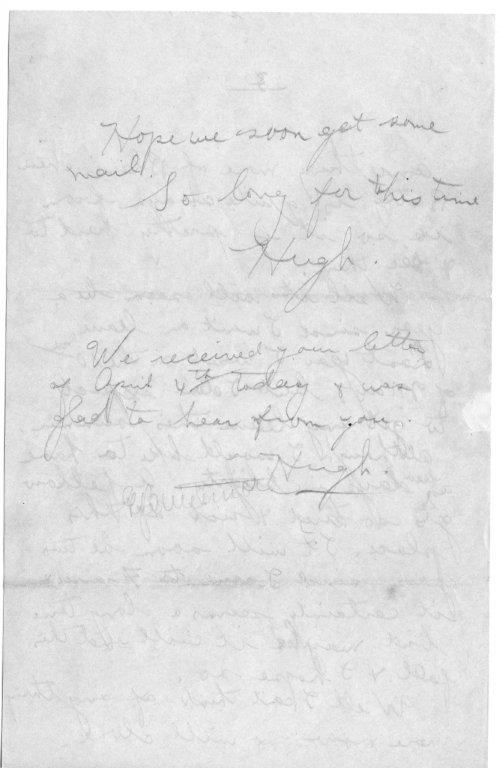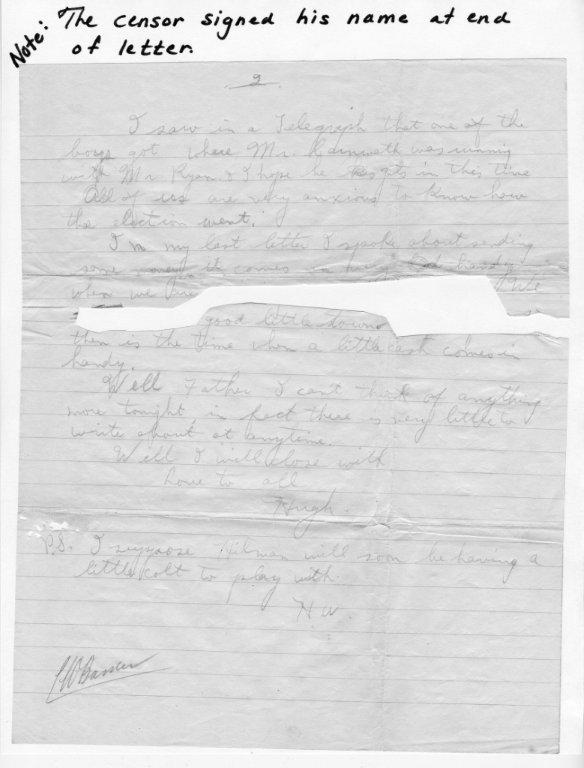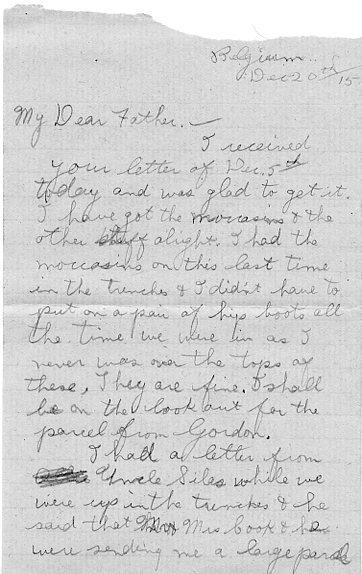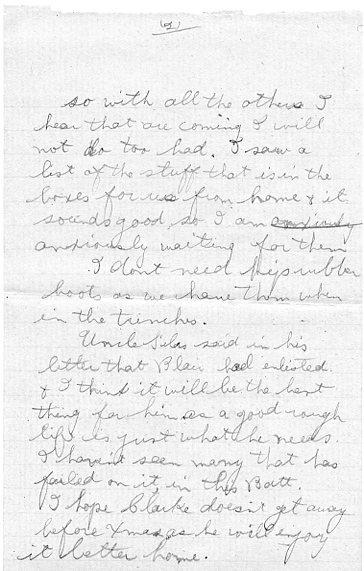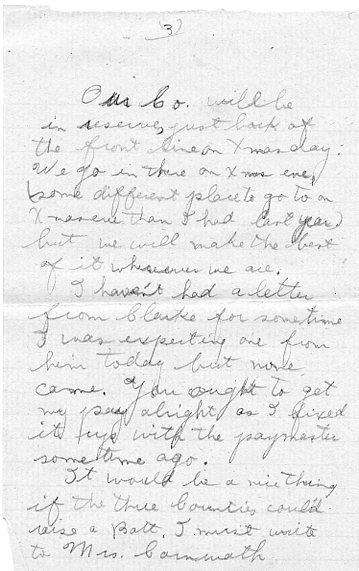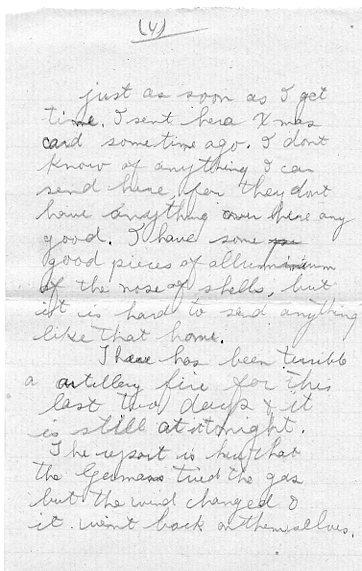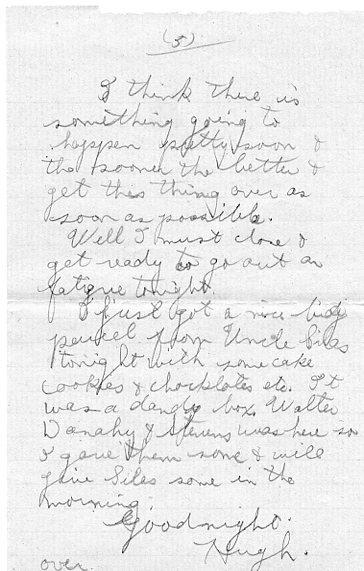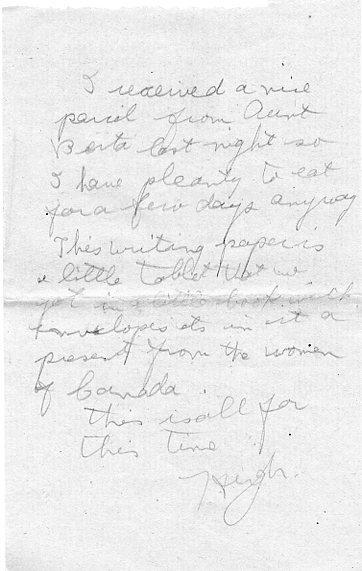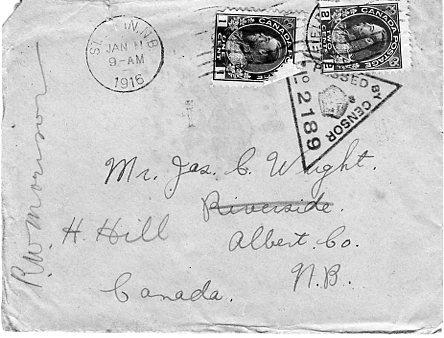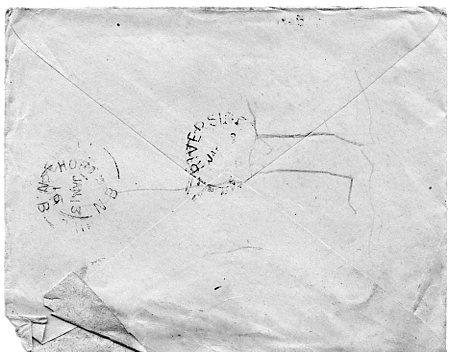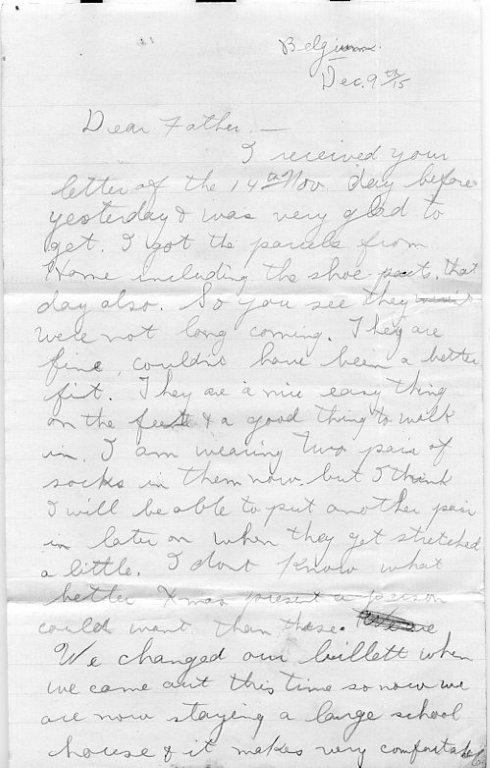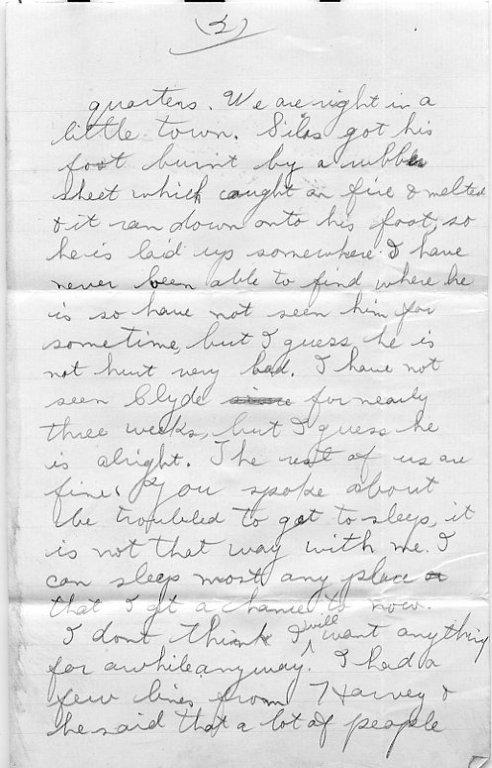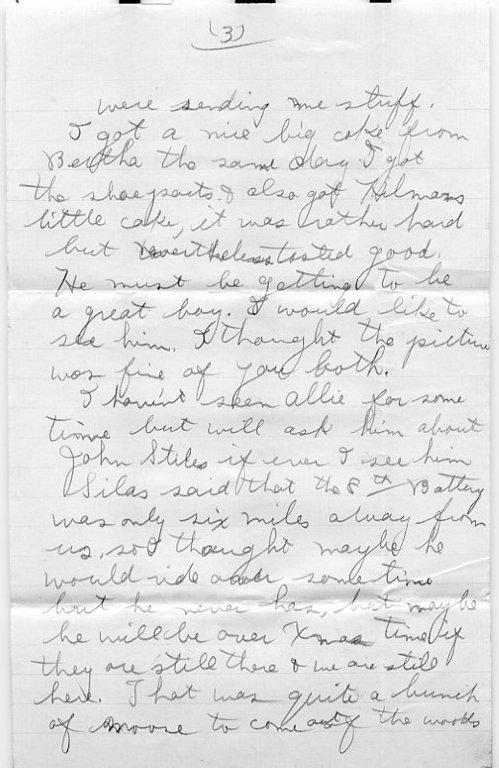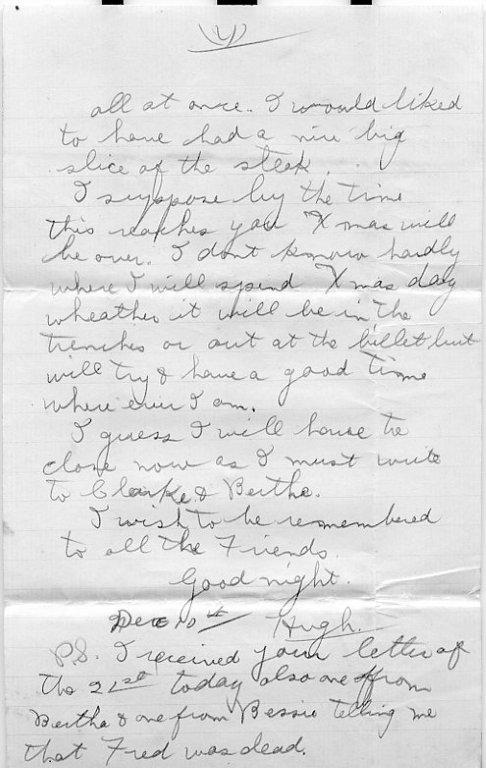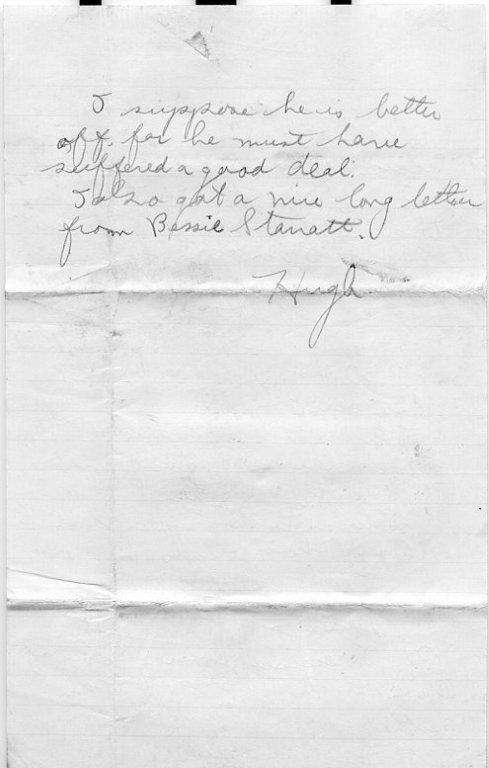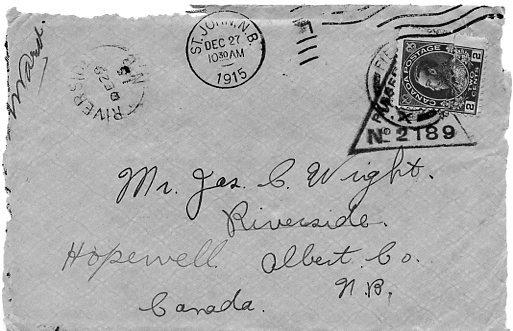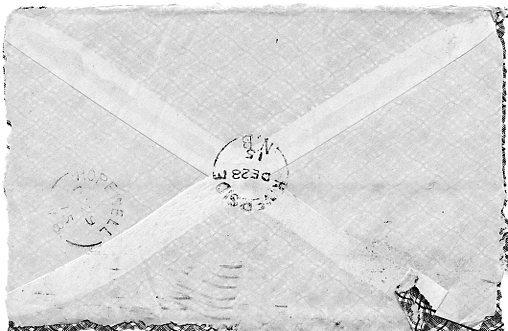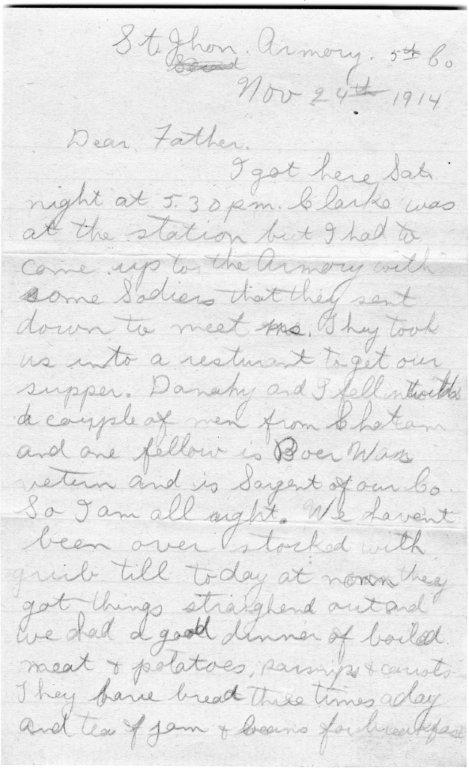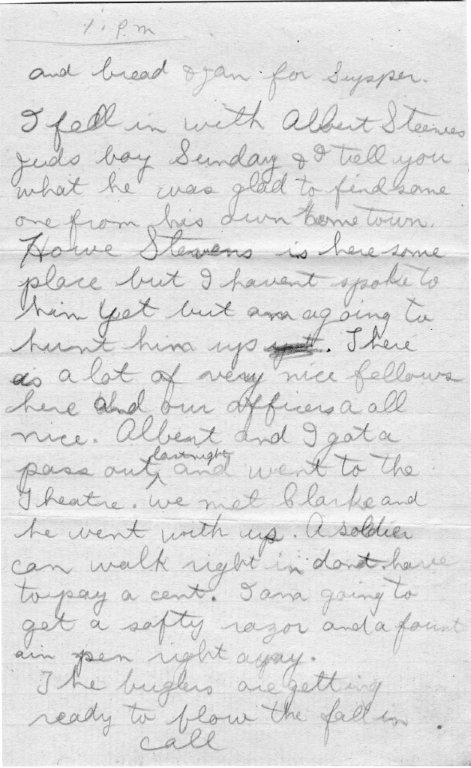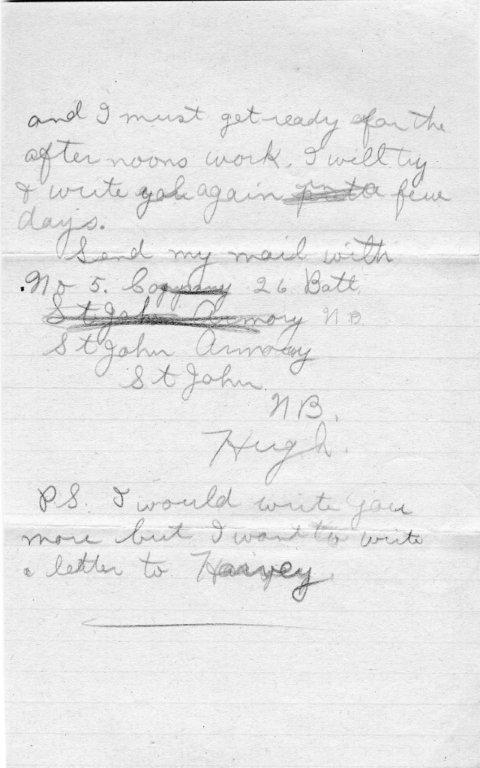“Christmas Cards from First World War soldier, Hugh Wright” - A Great War Tradition
During the years of the First World War (1914 -1918) when the soldiers had to spend Christmas far from home, separated from their families and friends, Christmas cards were important reminders that there was life outside the trenches and outside of the war. Here are a few sent by Hugh Wright. Read more here.
World War I letter written by Albert County soldier, Hugh Wright on November 11, 1918
A Window on the Great War - 100 Years to the Day - A Letter from the Front, March 14, 1918 France
This World War One letter was written by Hugh C. Wright of Shepody (Hopewell) Albert County on March 14, 1918 while he was in serving in the Canadian Garrison Artillery (CGA) in France. Hugh had enlisted in the 26th Battalion on November 17, 1914 when he was 19 years old. He sailed with the 26th Battalion from Saint John on June 13, 1915 aboard the steamship “Caledonia”. They arrived in England on June 24, 1915 where they underwent rigorous training in preparation for going to the battle front.
Hugh served in the 26th Bn, 5th Infantry Brigade in Belgium and France spending 17 months in the trenches. In February 1917, he transferred to the 4th Siege Battery, 2nd Brigade CGA and was a gunner for the remainder of the war. He was discharged on May 10, 1919...on his 24th birthday!
Hugh Wright was the youngest son of James and Jane Wright. Hugh's letters are addressed … “Dear Father” because his mother had died when he was only 7 years old.
Hugh's brother, Clarke Wright, of Hopewell (Shepody) enlisted on October 19, 1915 and went overseas with the C.E.F. Clarke also served in the 4th Siege Battery for the remainder of the war.
“I am very fortunate to have over 50 letters that my Great Uncle Hugh wrote to his family while serving in WWI”. Great Niece Dawne McLean
With many thanks to Hugh Wright's great niece, Dawne McLean who kindly submitted the letter.
"
France
March 14th 1918
Dear Father,
Well, I suppose you will think that I have forgotten you since I have not written for some time, but we have been working hard for this last couple of weeks and it has just slacked off.
Clarke and I had a parcel from Aunt Berta last night and believe me they came in fine.
I received your nice long letter a few days ago and we were awful glad to hear from you.
I saw a piece in the Telegraph that the gov't was going to take over the S & A railroad. It would be a good thing I should think if it did.
Well Father, Clarke and I will be going on leave together this time. I guess we will be going about the last of next month, but I am sorry to say that I have not much money coming to me as it has been such a short time since my last one, so I would like to have $75 if possible. I hate to ask you, but a fellow can't very well have a good time without money and everything costs so much now.
Will see Clarke and find out the best way to send the money,
will finish in the morning.
Well, will close with Love to all
Hugh
Get the Bank to cable the money to their agency in London, the same as Clarke's is being done. Don't delay it any longer than possible as we may get away in a month's time.
**************************
A Window on the Great War - A Letter from the Front, April 29, 1917 France
This World War One letter was written by Hugh C. Wright of Shepody (Hopewell) Albert County on April 29, 1917 while he was in serving in the Canadian Garrison Artillery (CGA) in France. Hugh had enlisted in the 26th Battalion on November 17, 1914 when he was 19 years old. He sailed with the 26th Battalion from Saint John on June 13, 1915 aboard the steamship “Caledonia”. They arrived in England on June 24, 1915 where they underwent rigorous training in preparation for going to the battle front.
Hugh served in the 26th Bn, 5th Infantry Brigade in Belgium and France spending 17 months in the trenches. In February 1917, he transferred to the 4th Siege Battery, 2nd Brigade CGA and was a gunner for the remainder of the war. He was discharged on May 10, 1919...on his 24th birthday!
Hugh Wright was the youngest son of James and Jane Wright. Hugh's letters are addressed … “Dear Father” because his mother had died when he was only 7 years old.
“I am very fortunate to have over 50 letters that my Great Uncle Hugh wrote to his family while serving in WWI”. Great Niece Dawne McLean
With many thanks to Hugh Wright's great niece, Dawne McLean who kindly submitted the letter.
" Somewhere in France
April 29th/17
Dear Father & all ~
Well another week has rolled by & it is my turn to write this Sunday
so here I am trying to scratch off a few lines before dinner.
Well at last the cold weather appears to be about all over & now it
is nice and warm so a fellow can lay out on the grass and enjoy himself
(that is when not working) but a fellow does not mind working when
it is nice and dry underfoot.
I suppose Clarke told you last week about us being up to the Batt and saw
Billie R and Walter D but did not see Joe as he was in the hospital sick and
I am glad that he is, as there has been some pretty tough scrapping going on
here lately and he is better out of it. I have never heard whether Guy R has
ever come to France or not. I suppose Jim is in England yet training.
We haven't had any mail from home for nearly two weeks so it must be delayed
somewhere. I wish you would get me a couple of suits of underwear like I
used to wear when home. The stuff that we get here at the baths is not much,
so I will get my own and do my own washing this summer.
I have not seen or heard anything more of Blair. Their Battery is quite aways
from us so it is pretty hard to see them.
Well, it will soon be a year since I went on leave. Last year I went on the
10th of May, but I don't expect to get any leave this summer although I
would like to have a few days in blighty.
A fellow gets so tired and sick of this place. It will soon be two years since
I came to France & it certainly seems a long time but maybe it will end this fall
and I hope so.
Well I can't think of anything more now so will close.
Hope we soon get some mail.
So long for this time
Hugh
We received your letter of April 4th today and was glad to hear from you.
Hugh
(the signature of the Censor is also written on this last page of the letter)"
A Window on the Great War - A Letter from the Front, March 11, 1917 France
This World War I letter was written by Hugh C. Wright of Shepody (Hopewell) Albert County on March 11, 1917 while he was in serving in the Canadian Garrison Artillery in France. Hugh had enlisted in the 26th Battalion on November 17, 1914 when he was 19 years old. He sailed with the 26th Bn from Saint John on June 13, 1915 aboard the steamship “Caledonia”. They arrived in England on June 24, 1915 where they underwent rigorous training in preparation for going to the battle front.
Hugh served in the 26th Bn, 5th Infantry Brigade in Belgium and France spending 17 months in the trenches. In February 1917, he transferred to the 4th Siege Battery, 2nd Brigade CGA and was a gunner for the remainder of the war. He was discharged on May 10, 1919...on his 24th birthday!
Hugh Wright was the youngest son of James and Jane Wright. Hugh's letters are addressed … “Dear Father” because his mother had died when he was only 7 years old.
The letter was written in pencil and the censor had cut out words that might give information of location if intercepted by the enemy. The censor also signed his name at the bottom of the last page of the letter.
“I am very fortunate to have over 50 letters that my Great Uncle Hugh wrote to his family while serving in WWI”. Great Niece Dawne McLean
With many thanks to Hugh Wright's great niece, Dawne McLean who kindly submitted the letter.
"
March 11, 1917 France
Dear Father,
I am writing tonight sitting outdoors and believe me it is one fine night, nice and warm and is really the first warm day we have had this spring so far.
It has been some time since I wrote but we are (words cut out by censor) that a person does not get much chance to write, so I hope you don't worry much about me.
I like the Battery fine. I have had more time to myself since I came here that I had all the time I was in (words cut out by censor). Of course we are not idle all the time, we certainly have some hard work at times.
I have not seen Clarke since I came here as he is a rear guard someplace, but I guess he is having a fairly easy time, but I imagine he would sooner be back with the boys.
I have only got one parcel since I came here and that was from Mrs. Paul Robinson. The last letter that I had from home was the one with the clipping of Mr. McClelan in it.
I had a long letter from Uncle Silas yesterday and he said that he was sending me a box so I hope that it soon gets here.
I saw in a Telegraph that one of the boys got where Mr. Carnwarth was running with Mr. Ryan and I hope he gets in this time. All of us are very anxious to know how the election went.
In my last letter I spoke about sending some money, it comes in very handy when we are (words cut out by censor) good little town (words cut out by censor) then is the time when a little cash comes in handy.
Well, Father I can't think of anything more tonight, in fact there is very little to write about anytime.
Well, I will close with
Love to all
Hugh
P.S. I suppose Hillman will soon be having a little colt to play with.
HW
(And the letter is signed at the bottom by the censor LW Bassler )
A Window on the Great War - A Christmas Letter from the Trenches, December 20, 1915 Belgium
One Hundred years ago today (Dec 20, 2015), Hugh C. Wright from Shepody, Albert County, NB was busy fighting with the 26th New Brunswick battalion in trenches of Belgium. He was only 20 years old at the time. This was one of his letters home and was written December 20, 1915.
A note on the Author - Hugh Carlisle Wright, from Hopewell,(Shepody), Albert County, NB, enlisted in the 26th Battalion on November 17, 1914. He was 19 years of age. He was in A Company, No. 1 Platoon while training in Saint John. He served in the 26th Battalion, 5th Infantry Brigade in Belgium and France and spent 17 months in the trenches. In February 1917, he transferred to the 4th Siege Battery, 2nd Brigade CGA and was a gunner for the remainder of the war. He was discharged in May 10, 1919...on his birthday!
Hugh's letters are addressed … “Dear Father” because his mother died when he was only 7 years old. Harvey and Clarke were Hugh's older brothers. His brother Clarke enlisted in October 1915, arriving in England with CEF April 1916. Harvey didn't enlist but stayed home to run the family farm in Shepody.
With many thanks to Hugh Wright's great niece, Dawne McLean who kindly submitted the letter.
“Belgium
Dec 20, 1915
My Dear Father,
I received your letter of Dec. 5th to day and was glad to get it. I have got the moccasins and the stuff alright. I had the moccasins on this last time in the trenches and I didn’t have to put on a pair of hip boots all the time we were in as I never was over the tops of these. They are fine.
I shall be on the look out for the parcel from Gordon. I had a letter from Uncle Silas while we were up in the trenches and he said that Mrs. Cook and he were sending me a large parcel, so with all the others I hear that are coming I will not do too bad. I saw a list of stuff that is in the boxes for us from home and it sounds good so I am anxiously waiting for them.
I don’t need hip rubber boots as we have them when in the trenches.
Uncle Silas said in his letter that Blair had enlisted and I think it will be the best thing for him as a good rough life is just what he needs. I haven’t seen many that have failed on it in this Batt.
I hope Clarke doesn’t get away before Xmas as he will enjoy it better home.
Our Company will be in as usual just back of the front line on Xmas Day. We go in there on Xmas Eve (some different place to go on Xmas eve than I had last year), but we will make the best of it wherever we are.
I haven’t had a letter from Clarke for some time. I was expecting one from him today but none came. You ought to get my pay alright as I fixed it up with the paymaster some time ago.
It would be a nice thing if the three counties could raise a Batt. I must write to Mrs. Carnwarth just as soon as I get time. I sent her a Xmas Card some time ago. I don’t know of anything I can send here for they don’t have anything over here any good. I have some good pieces of aluminum off the nose of shells, but it is hard to send anything like that home.
There has been terrible artillery fire for these last two days and it is still at it tonight. The report is here that the Germans tried the gas but the wind changed and it went back at themselves.
I think there is something going to happen pretty soon and the sooner the better and get this thing over as soon as possible.
Well, I must close and get ready to go out on fatigue tonight.
I just got a nice big parcel from Uncle Silas tonight with some cake, cookies and chocolate. It was a dandy box. Walter Danahy and Stevens were here so I gave them some and will give Silas some in the morning.
Good night, Hugh
(letter cont’d next day)
I received a nice parcel from Aunt Berta last night so I have plenty to eat for a few days anyway.
This writing paper is a little tablet that we got in a little book with envelopes in it - a present from the women of Canada.
This is all for this time.
Hugh
”
Hugh was one of the hundreds of Albert County men who volunteered for the Canadian Expeditionary Force (CEF), the majority joining the New Brunswick 26th Battalion. It was because of their sacrifices that Albert County was awarded the 77mm field cannon which sits in the square in Hopewell Cape. The museum is in process of restoring this cannon to help preserve their stories. If you have not done so, please donate to the Victory Cannon Campaign. You can donate online here.
A Window on the Great War - A Letter from the Front, December 9, 1915 Belgium
One Hundred years ago, Hugh C. Wright from Shepody, Albert County, NB was busy fighting with the 26th New Brunswick battalion in trenches of Belgium. He was only 20 years old at the time. This was one of his letters home and was written December 9 & 10, 1915.
A note on the Author - Hugh Carlisle Wright, from Hopewell,(Shepody), Albert County, NB, enlisted in the 26th Battalion on November 17, 1914. He was 19 years of age. He was in A Company, No. 1 Platoon while training in Saint John. He served in the 26th Battalion, 5th Infantry Brigade in Belgium and France and spent 17 months in the trenches. In February 1917, he transferred to the 4th Siege Battery, 2nd Brigade CGA and was a gunner for the remainder of the war. He was discharged in May 10, 1919...on his birthday!
Hugh's letters are addressed … “Dear Father” because his mother died when he was only 7 years old. Harvey and Clarke were Hugh's older brothers. His brother Clarke enlisted in October 1915, arriving in England with CEF April 1916. Harvey didn't enlist but stayed home to run the family farm in Shepody.
It's amazing to have the original envelope for the letter (scroll through the pictures) which shows the letter probably left Belgium on the 11 and arrived in Riverside on the 28th of December only 17 days...
With many thanks to Hugh Wright's great niece, Dawne McLean who kindly submitted the letter.
“Belgium
Dec. 9Th, 1915
Dear Father,
I received your letter of the 14th November day before yesterday and was very glad to get it. I got the parcels from home including the shoe pacts that day also. So you see they were not that long coming. They are fine, couldn’t have been a better fit. They are a nice easy thing on the feet and a good thing to walk in. I am wearing two pair of socks in them now, but I think I will be able to put another pair in later when they get stretched a little. I don’t know what better Christmas present a person could want than these.
We changed our billet when we came out this time, so now we are staying in a large school house and it makes very comfortable quarters. We are right in a little town. Silas got his foot burned by a rubber sheet which caught on fire and melted and ran down onto his foot, so he is laid up somewhere and I have never been able to find where he is so have not seen him for some time, but I guess he is not hurt very bad. I have not seen Clyde for nearly three weeks, but I guess he is alright. The rest of us are fine.
You spoke about being troubled to get to sleep, it is not that way with me. I can sleep most any place that I get a chance to now.
I don’t think I will want anything for a while anyway. I had a few lines from Harvey and he said a lot of people were sending me stuff. I got a nice big cake from Bertha the same day I got the shoe pacts and I also got Hillman’s little cake. It was rather hard, but nevertheless tasted good. He must be getting to be a great boy. I would like to see him. I thought the picture was fine of you both.
I haven’t seen Allie for some time, but will ask him about John Stiles if ever I see him.
Silas said that the 8th Battery was only six miles away from us, so I thought maybe he would ride over some time but he never has, but maybe he will over Christmas time, if they are still there and we are still here.
That was quite a bunch of moose to come out of the woods all at once. I would like to have had a nice big slice of the steak.
I suppose by the time this reaches you Xmas will be all over. I don’t know hardly where I will spend Xmas Day, whether it will be in the trenches or out at the billet but I will try to have a good time wherever I am.
I guess I will have to close now as I must write to Clarke and Bertha.
I wish to be remembered to all the Friends
Good night
Hugh
Dec. 10th
P.S. I received your letter of the 21st today, also one from Bertha and one from Bessie telling me that Fred was dead. I suppose he is better off for he must have suffered a good deal.
I also got a nice long letter from Bessie Starratt.
Hugh
”
Hugh was one of the hundreds of Albert County men who volunteered for the Canadian Expeditionary Force (CEF), the majority joining the New Brunswick 26th Battalion. It was because of their sacrifices that Albert County was awarded the 77mm field cannon which sits in the square in Hopewell Cape. The museum is in process of restoring this cannon to help preserve their stories. If you have not done so, please donate to the Victory Cannon Campaign. You can donate online here.
A Window on the Great War: 100 Year Old First Letter Home
One Hundred years ago, Hugh C. Wright from Shepody, Albert County, NB arrived by train in St. John on Saturday, Nov. 22 and signed up to join the 26th Battalion on the same day. He was only 19 years old. His first letter was written to his father Monday, November 24, 1914. After training in St. John for 8 months the 26th Battalion left for England on June 13, 1915 on board the ship “Caledonia”.
Hugh was one of the hundreds of Albert County men who volunteered for the Canadian Expeditionary Force (CEF), the majority joining the New Brunswick 26th Battalion. It was because of their sacrifices that Albert County was awarded the 77mm field cannon which sits in the square in Hopewell Cape. The museum is in process of restoring this cannon to help preserve their stories. If you have not done so, please donate to the Victory Cannon Campaign. You can donate online here.
(Notes from the letter: Harvey was Hugh's oldest brother who was responsible for the farm at home. Clarke was another brother who was working at a bank in St.John, he joined the 26th Battalion on Oct 19, 1915 and went overseas. Albert Steeves was killed overseas.)
With many thanks to Hugh Wright's great niece, Dawne McLean who kindly submitted the letter.
“St. John Armory, 5th Company
November 24th, 1914
Dear Father,
I got here Saturday night at 5:30pm. Clarke was at the station, but I had to come up to the Armory with some soldiers that they sent down to meet us. They took us into a restaurant to get our supper.
Danahy and I fell in with a couple of men from Chatham and one fellow is a Boer War veteran and is Sergeant of our Company. So I am all right.
We haven’t been over stocked with grub till today at noon. They got things straightened out and we had a good dinner of boiled meat and potatoes, parsnips and carrots. They have bread there three times a day and tea and jam and beans for breakfast and bread and jam for supper.
I fell in with Albert Steeves, Jud’s boy on Sunday and I tell you was he ever glad to find someone from his own hometown.
Howe Stevens is here some place but I haven’t spoken to him yet, but am going to hunt him up. There are a lot of very nice fellows here and our officers are all nice.
Albert and I got a pass out last night and went to the theatre. We met Clarke and he went with us. A soldier can walk right in and doesn’t have to pay a cent. I am going to get a safety razor and a fountain pen right away.
The buglers are getting ready to blow the fall in call and I must get ready for the afternoon’s work. I will try to write again in a few days. Send my mail to 5th Company, 26th Battalion, St. John Armory, St. John, NB
Hugh
P.S. I would write you more but I want to write a letter to Harvey. ”



